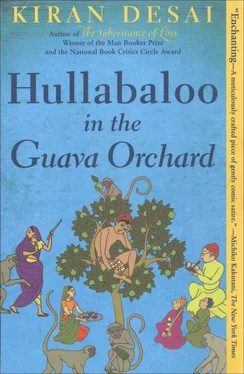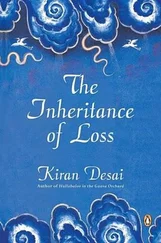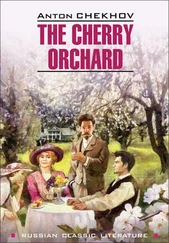Meanwhile, the police were luckier than the army men, for it had been generally agreed upon that they were incapable of taking an active part in something on such a great scale as this and instead they had been given the job of preparing the nets that were to be used to catch the monkeys. Under the gentle jurisdiction of the superintendent, they sat lazily outside the police station with a pile of fishing nets and metal rings, needles and nylon rope, not at all sure of what they ought to be doing, but enjoying themselves like old fisherwomen fussing with the nets in the afternoon sun. ‘Arre, Chottu,’ they called to the tea boy. ‘Arre, over here,’ to the sweet-potato seller, the peanut man and the cold-drink cart. Thus they made the most of this time and were content.
About Sampath’s tree there was a feeling of the air being stretched tight and wrapped around and around him. When he peered down, all he could see was an ugly sea of humanity. Nobody respected his visiting hours any more. Several men marched about the periphery of the orchard, banging the ground with sticks and blowing upon whistles in a round-the-clock watch instituted by Mr Chawla to give warning of any disturbance. These dangerous days, who knew what would happen, what they would have to watch out for, which unexpected happening? They were not safe. Also, of course, they had to keep a watch for the monkeys. What would they do next? At the slightest rustle in the night, they shone bright torches into the trees; often Sampath found himself awakened by a searchlight-like glare. If only these watchmen would fall asleep at their posts the way watchmen were known to do, thought Sampath. But no, this lot were an insomniac brigade, tireless and unnervingly zealous in their duties. At the first hint of dawn, the crowds arrived with their loudspeakers and he was enveloped once again in slogan-shouting and argument.
How, how would he manage his escape?
He was practically ill with worry and nerves by now, unable any more to sleep and unable to eat. His mother tried this and that to tempt his appetite, to resurrect his fading rosy cheeks, but nothing seemed to work … not the little river fish he so loved, not the fiery chillies from her own especially fiery chilli bush, not the plump, sleepy pigeons with their tender melting flesh, not an enormous goldfish she caught in the ornamental pond in the convent grounds. Never mind … never mind. Soon she would offer him something altogether new, something to spark his spirits and jerk him to life. On Monday, the thirtieth day of April. She began to put together the ingredients for the feast to come. It was a hard process, for the main ingredient was an entirely new one, of course, and still mysterious to her. She had no idea of its savour, its toughness, its heaviness or lightness, its darkness, or its power as a catalyst to bring other flavours to fullness. Her preparations would have to be made with only instinct to guide her, the sureness of instinct, buoyed by a bringing together of all her expertise, all her talents, to make a triumph of what might be her only chance to cook this creature …
Sampath stared up into the mountains, tilting his head all the way back, to look upon where there was not a trace of civilization. There, up high, as if tumbling from the sky, a waterfall cascaded down sylvan slopes, so pale, so distant he did not know if it was real or merely his imagination melding with the power of sight to produce a trick upon him. There there were no villages, no houses, no people … Just sunlit forest and rock, and the living rough white water. Jealously, he looked back at the birds that fluttered about him searching for crumbs: these small creatures with their delicate ribs, their beating wings that scooped hearts light as snow through the clarity of air. His face bore a desperate, hunted look.
‘He is in another world,’ whispered the devotees reverently, while Sampath paid them no attention, just stared out over their heads, let them lift his foot and lay it upon their heads as they claimed his blessing. These days it turned his stomach, now that the whole business was not lighthearted any more, but mean and complicated.
He stared at the sky. The silvery evening air seemed to distil itself into the armour of the fish that steamed gently before him, into the powdery hair of the langurs sitting in his tree, still unaware, it seemed, of all the plotting and planning that was going on against them. There they were, chattering, playing, grooming each other as usual. Little did they know …
Trapped in his room, aunties and sisters keeping watch out of every window, the Hungry Hop boy paced up and down. From a distance, he could hear the noise of the protesters and demonstrators, and he felt it was unjust that he should not be allowed out to take part in the excitement.
‘I’ll take the van,’ he pleaded. ‘It will be such good business.’
But no, even this was not enough to shake his family’s conviction that he should be kept firmly locked up, allowed to emerge only if rooted in the honourable state of wedlock. In the matter of a few days’ time, the Hungry Hop boy had been demoted from a life of self-imposed imprisonment to one of family-enforced detainment and he felt as if his pride were being overlooked and insulted. He paced up and down his small room, wondering about Pinky’s fate in the midst of all the monkey trouble, about his own fate … Up and down. And whenever he stopped to listen, with an indignant ear pressed against the door, he could hear the babble of marriage negotiations rising up the stairs from the living room down below. Time was running out. They were resorting to the oldest trick in the book.
He smuggled an urgent note to Pinky via the faithful milkman, who delivered it when he returned home on the same bus Sampath had taken when he had first left Shahkot six months ago. ‘Very little time to lose,’ the note read, a little runny from a leftover bit of buffalo milk in the canister where the milkman had placed it. ‘Marriage is in the works.’
As he waited for a reply, he paced the length of his room with greater and greater vigour. From time to time, he stopped and tossed back his hair, a thrill running through him like an electric current. Here was his life, just like in a scene from the movies. He felt grateful for the glamour; his heart hung suspended as if dangling from a mountain ledge.
By the next morning he had a response from Pinky who did not believe in delays. In a firm hand, she proposed they escape in the Hungry Hop van and drive far away, to a new town, a new place where they would not have to bother with his unreasonable family. That seemed the only available option. ‘On Monday, 30 April,’ read her practical note, ‘they are going to catch the monkeys. Everybody will be busy and paying no attention. Meet me under the big tamarind tree on the street leading to the orchard-bazaar road at 5.00 a.m. in the Kwality van, and from then on we will see.’
Monday, 30 April … that was only three days away! Seized by courage, Hungry Hop wrote back with a trembling hand: ‘Without fail I will be there.’
Although, once she received this note, Pinky was caught up in her own absorbing affairs of packing her belongings and getting ready to leave — all in secret, of course — she could not help feeling sorry for her brother. It did not seem quite fair, she thought, that just when her life was blossoming and flourishing, his should be cut down and curtailed. This she felt, even though her own feelings towards the monkeys were so different from his. Generous in these days of love, she climbed up the ladder against his tree. ‘I have an idea,’ she said.
But Sampath, back to his old ways of barely speaking, merely looked blankly at her and said nothing at all in response.
Читать дальше












